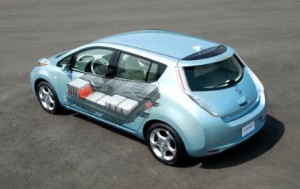 Lithium ion batteries are coming down in cost, but it’s all relative. Here’s a clear example…… The starting price on the Tesla Model S with a 60 kilowatt hours (60 kWh) lithium battery is $68,710; and the price goes up to $83,760 for the Model S with the 85 kWh option. The battery pack in a Model S costs about $30,000.
Lithium ion batteries are coming down in cost, but it’s all relative. Here’s a clear example…… The starting price on the Tesla Model S with a 60 kilowatt hours (60 kWh) lithium battery is $68,710; and the price goes up to $83,760 for the Model S with the 85 kWh option. The battery pack in a Model S costs about $30,000.
Analysts carefully watch what’s happening to the cost of lithium batteries, their weight, size, and storage capacity. Building a smaller, lighter and cheaper battery for Tesla’s upcoming lower-cost sedan has been at the heart of its $5 billion “Gigafactory” in Reno, Nev.
It’s going to take a few model years to see the price drop substantially. Here are some of the latest developments in electric vehicle batteries……….
- Sakti3 says that its solid-state cell is close to doubling the energy density of today’s lithium-ion cell chemistries, at only one-fifth of their current cost. That technology will support a battery cost of just $100 per kWh – but that won’t be happening until the end of this decade. Satki3, led by University of Michigan engineering professor Ann Marie Sastry, has received investment capital from GM Ventures. That goes back to 2010, when Sakti3 received a lot of media coverage and exposure (such as Sastry speaking at the Bloomberg symposium in Los Angeles during the time the Nissan Leaf and Chevy Volt were first being delivered to dealers in December 2010). The company went under the radar for a few years and has reemerged, with a recent article coming out in Fortune on the company.
- Panasonic has created a new company to oversee its operations at the Gigafactory as it goes online over the next two years. Panasonic has made an initial investment of $92 million, and that payment is expected to be the first of many cash infusions. Tesla Motors CEO Elon Musk says that as many as 500,000 battery packs per year could be built there by 2020. Tesla management will be in charge of the factory; Panasonic will provide the necessary manufacturing equipment and lithium-ion battery components.
- Nissan has been building its own proprietary lithium-ion battery pack for the Leaf sedan. It’s been seven years since that battery technology started up, and it doesn’t look like Nissan will be bringing in LG Chem, Panasonic, Sakti3, or A123 Systems for its electric vehicles. At the Paris Motor Show, Nissan CEO Carlos Ghosn shed more light on the topic. “With electric cars, we consider that the reason for which we got involved with batteries, at the beginning, is we couldn’t find batteries good enough for our cars—so we decided to assemble our own batteries,” Ghosn said. “And we will continue to do that as long as we don’t think there are enough good batteries on the market, or we don’t think there is competition to sustain the move on batteries.”
- Bill Reinert, the recently retired national manager of Toyota’s advanced technology group – and a very outspoken, brutally honest speaker at industry conferences – is still more impressed with hybrids than electric vehicles. Here’s what he said to a Yale University journal, Yale Environment 360….. “There’s nothing promising beyond the lithium battery on the battery horizon. And the lithium battery has tremendous shortcomings for cars – for example, it doesn’t maintain a full charge in hot weather, which creates a battery degradation cycle. Even the Tesla’s Model S, with its biggest battery, when driven like a normal car can’t always deliver 200 miles of range, and the [company’s charging stations] are currently 200 miles away from each other. To give a Tesla much extra driving range, the battery weight required would greatly decrease the distance it could travel per kilowatt and also greatly increase its cost.”




As long as I have followed the topic of battery technology, we have been promised significant improvement in about 5 years. The years keep passing and I suppose I will die before the promised improvements arrive – at least a cost competitive solution.
Please, some accuracy in basic terms:
“… 60 kilowatt per hour…” should be 60 kilowatt hours (60 kWh)
“…cost of just $100 kWh-hour…” should be $ 100 per kWh.
If you misuse the basic units you will lose your creditability among professionals.
Thanks for catching the errors. Those changes have been made.
Thanks for a perspective on a topic that I have too little knowledge about and one that we all need invest.
Thanks for the comment Vincent!
Jon